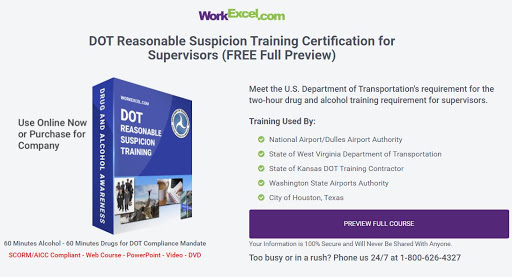How DOT Supervisors Become Drug and Alcohol Enablers Despite Their Training
We sometimes think of concepts like "enabling" as clear cut and unambiguous. If we help someone to purchase or access drugs and alcohol, we are enabling. If we help someone to make excuses for their substance abuse, we are enabling. If we steer someone towards risky behavior, we are enabling.
If we are Department of Transportation supervisors implementing the Reasonable Suspicion training we have received in a professional capacity, then, surely, we are not enabling. Instead, we are actively making a positive difference.
But is this necessarily the case? In many instances, it might be the opposite. Sure, supervisors carry out an important role, and the DOT Reasonable Suspicion policy can certainly be a force for good, but we must still tread carefully. A DOT supervisor can still be an enabler and can still promote the very risky behaviors they are intending to control.
Let's explore how and why this happens.
Enabling is a path of least resistance
Most of us human beings, in our default setting, do not like confrontation. We may find ourselves in situations in which confrontation is necessary — perhaps when we do our duty as parents or when we take on any other role with an element of responsibility — but, for the most part, we would rather not explore that side of our personalities.This is why, whether we mean to or not, we often find ourselves on the path of least resistance — i.e., taking the route with the least friction, the least trouble, and the least chance of confrontation. When we start to factor in something as mind-altering and as potentially volatile as drug or alcohol abuse, that path of least resistance becomes all the more attractive.
So, we may choose to passively enable our friends simply because it is the easiest option. We may find ourselves nodding in tacit agreement, shrugging, and explaining things away even though we know we should be stepping in and taking action. And why? Because we don't want our friends to get upset, and we don't want to destroy our relationship.
We may even start to doubt ourselves. Maybe that one drink is okay, maybe she can handle it. Maybe that one line at that one party is okay and won't send him into a spiral. Once this doubt creeps in, it can become difficult to know what to do. This is basic human psychology, but it's very powerful.
Professional relationships are often more than that
Of course, we have lapsed into discussing relationships between personal friends. A DOT supervisor is a professional, and as such, they have a professional relationship with the people they are supervising. There is a clear distinction.Except, is this distinction really so clear?
Americans work, on average, 34.4 hours a week , with many of us working far more. Work is such a crucial part of all our lives that, by extension, the people we work with also become critical. Employers understand the value of an engaged and connected workforce, and they encourage personal relationships as a way of nurturing productivity .
With this in mind, it's easy to see why the boundaries can become blurred. A DOT supervisor may not even notice the friendship developing until it begins to hinder the duties of their role.
Beginning a cycle of enabling
This is how the cycle of enabling begins. It may become clear that a colleague has a problem, but those who could make a difference grow too close to that colleague to effectively make a difference. Excuses, doubts, and false rationalization all begin to creep in, and the colleague's addiction and pattern of risky behaviors go unchecked.This cycle is reinforced by another aspect: false positivity. We may feel that extreme actions, such as disciplinary procedures, are too "harsh", even though they will in fact help the colleague who is struggling, especially in the long term. We may instead fall into a process of "helping" — i.e., offering our support and guidance to our colleague and friend, all the while propping up their addiction without providing any meaningful intervention.
In effect, we become complicit in their actions and may find ourselves directly or indirectly responsible for any of the negative results that follow. Handouts and tip sheets provided to DOT supervisors being educated in reasonable suspicion can help get this complicated points across.
Acting as a DOT supervisor involves a difficult negotiation. It involves looking at the bigger picture, stepping outside of our personal and professional relationships, and deciding on a course of action that protects the health, safety, and well-being of all. In many cases, this will include going against our inherent human nature, seeking confrontations with positive outcomes, and pursuing a path of change and growth, no matter how difficult that path may be.
Preview the full DOT Reasonable Suspicion Training Web Course or other formats here.

No comments:
Post a Comment